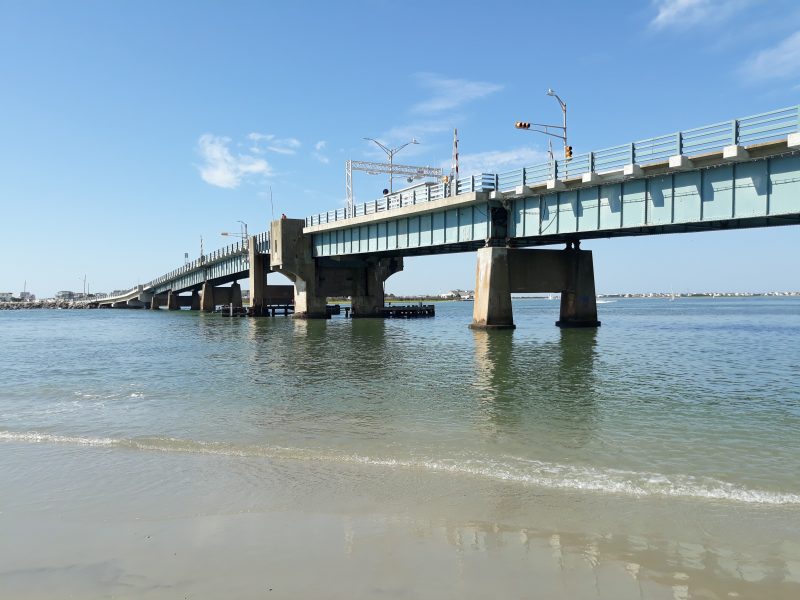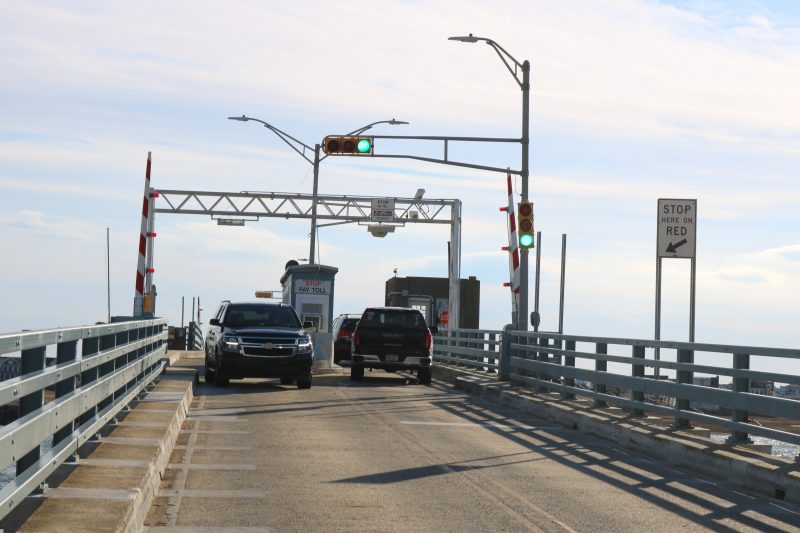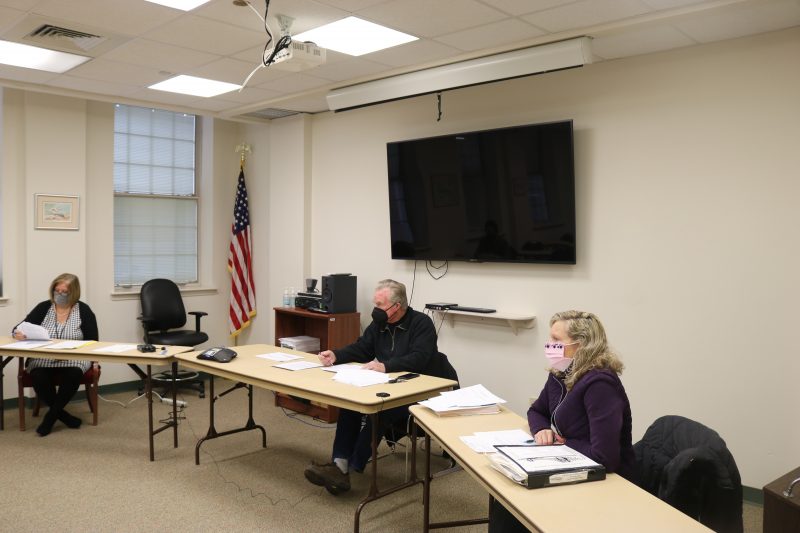The Cape May County Bridge Commission approves the toll increase during a meeting that was not attended by any members of the public.
 By DONALD WITTKOWSKI
The Cape May County Bridge Commission, emphasizing the need for more revenue to maintain its network of aging bridges, approved a three-stage toll increase Thursday that will double the fare from what motorists pay now.
Tolls will increase by 50 cents in 2022, 50 cents in 2023 and 50 cents in 2024. The current toll of $1.50 for cars will double to $3 once the increase is fully implemented by 2024.
Karen Coughlin, the commission’s executive director, said the toll increase for this year is tentatively scheduled for mid-March, once final adjustments are made to computer equipment. Tolls are scheduled to increase on Feb. 1 in both 2023 and 2024, she said.
The commission operates five toll bridges linking the Cape May County shore communities along the scenic Ocean Drive from Ocean City to Cape May. They include the Ocean City-Longport Bridge, Townsends Inlet Bridge, Corsons Inlet Bridge, Middle Thorofare Bridge and Grassy Sound Bridge.
The Townsends Inlet, Corsons Inlet, Middle Thorofare and Grassy Sound bridges date to the 1930s or 1940s and are often in need of maintenance or repair projects to keep them in operation. Higher tolls will generate extra revenue to help the commission pay for maintenance and smaller repair projects, the agency’s board members said.
“This is being done because it’s needed for maintenance and capital improvements. The (bridges are) 80 years old and in that timeframe, we’ve only raised the toll three times,” said Carol Brand, the commission’s chairwoman.
Brand noted that the last toll increase was in 2009.
Brand was joined by fellow board members Maryanne Murphy and Scott Halliday in approving the toll hike during a vote at the commission’s monthly board meeting.
“We as a commission have all agreed that we do not really want to raise the tolls, but it’s an absolute must if we want to safely sustain our bridges,” Murphy said. “We’re planning for the future maintenance of the bridges. We’re trying to be proactive in avoiding any fatalities and any more structural damage.”
As an example of the exorbitant financial commitment that is needed to maintain the bridges, Murphy said it costs about $2 million just to paint the railings on each span.
“Your average person does not know that. The cost of painting a bridge is just astronomical,” she said.
By DONALD WITTKOWSKI
The Cape May County Bridge Commission, emphasizing the need for more revenue to maintain its network of aging bridges, approved a three-stage toll increase Thursday that will double the fare from what motorists pay now.
Tolls will increase by 50 cents in 2022, 50 cents in 2023 and 50 cents in 2024. The current toll of $1.50 for cars will double to $3 once the increase is fully implemented by 2024.
Karen Coughlin, the commission’s executive director, said the toll increase for this year is tentatively scheduled for mid-March, once final adjustments are made to computer equipment. Tolls are scheduled to increase on Feb. 1 in both 2023 and 2024, she said.
The commission operates five toll bridges linking the Cape May County shore communities along the scenic Ocean Drive from Ocean City to Cape May. They include the Ocean City-Longport Bridge, Townsends Inlet Bridge, Corsons Inlet Bridge, Middle Thorofare Bridge and Grassy Sound Bridge.
The Townsends Inlet, Corsons Inlet, Middle Thorofare and Grassy Sound bridges date to the 1930s or 1940s and are often in need of maintenance or repair projects to keep them in operation. Higher tolls will generate extra revenue to help the commission pay for maintenance and smaller repair projects, the agency’s board members said.
“This is being done because it’s needed for maintenance and capital improvements. The (bridges are) 80 years old and in that timeframe, we’ve only raised the toll three times,” said Carol Brand, the commission’s chairwoman.
Brand noted that the last toll increase was in 2009.
Brand was joined by fellow board members Maryanne Murphy and Scott Halliday in approving the toll hike during a vote at the commission’s monthly board meeting.
“We as a commission have all agreed that we do not really want to raise the tolls, but it’s an absolute must if we want to safely sustain our bridges,” Murphy said. “We’re planning for the future maintenance of the bridges. We’re trying to be proactive in avoiding any fatalities and any more structural damage.”
As an example of the exorbitant financial commitment that is needed to maintain the bridges, Murphy said it costs about $2 million just to paint the railings on each span.
“Your average person does not know that. The cost of painting a bridge is just astronomical,” she said.
 The toll is currently $1.50 on the Townsends Inlet Bridge, but will increase by 50 cents per year from 2022 to 2024.
The Ocean City-Longport Bridge, built in 2002, is the commission’s only modern span. Halliday explained that maintenance and upkeep are needed even on a newer bridge.
“All of the bridges require maintenance. Even newer bridges require maintenance from time to time. Certainly, the older bridges are in much need of maintenance,” he said.
Currently, the commission depends on Cape May County to pay for all maintenance, repairs and upgrades to the bridges.
The toll hike will give the agency its own funding to help pay for those projects now, according to bridge commission documents explaining the reason for the increase.
The commission’s toll revenue for 2021 was about $3.2 million, Coughlin said. Currently, the commission uses its revenue for administrative expenses, payments to its vendors and to maintain a surplus.
With the toll increases, revenue is projected to increase to $4.2 million in 2022, $5.1 million in 2023 and $6.1 million in 2024. Of that revenue, $550,000 would go toward bridge projects in 2022, $1.5 million in 2023 and $2.5 million in 2024, commission documents show.
In addition to the higher tolls for cars, the bridge fare for trucks will also go up by 50 cents per year from 2022 to 2024. Depending on the number of axles they have and whether they are pulling a trailer, trucks currently pay tolls ranging from $2.75 to $12.75. Under the toll hike, the truck rates would range from $4.25 to $14.25 when the full increase is implemented by 2024, documents show.
About 85 percent of the bridge customers pay their fares using the E-ZPass automated toll system, Coughlin said. Others pay in cash. There will be no discounts for E-ZPass customers once the higher tolls go into effect, the commission said.
Leading up to Thursday’s vote, the commission opened up a public comment period on the toll increase between Dec. 8 and Jan. 8. Coughlin said the commission received only 28 public comments, a number that surprised her because more had been expected. Only two comments were in favor of the toll hike, she said.
No members of the public attended the commission’s meeting for the vote. Just two members of the media were in attendance.
The toll is currently $1.50 on the Townsends Inlet Bridge, but will increase by 50 cents per year from 2022 to 2024.
The Ocean City-Longport Bridge, built in 2002, is the commission’s only modern span. Halliday explained that maintenance and upkeep are needed even on a newer bridge.
“All of the bridges require maintenance. Even newer bridges require maintenance from time to time. Certainly, the older bridges are in much need of maintenance,” he said.
Currently, the commission depends on Cape May County to pay for all maintenance, repairs and upgrades to the bridges.
The toll hike will give the agency its own funding to help pay for those projects now, according to bridge commission documents explaining the reason for the increase.
The commission’s toll revenue for 2021 was about $3.2 million, Coughlin said. Currently, the commission uses its revenue for administrative expenses, payments to its vendors and to maintain a surplus.
With the toll increases, revenue is projected to increase to $4.2 million in 2022, $5.1 million in 2023 and $6.1 million in 2024. Of that revenue, $550,000 would go toward bridge projects in 2022, $1.5 million in 2023 and $2.5 million in 2024, commission documents show.
In addition to the higher tolls for cars, the bridge fare for trucks will also go up by 50 cents per year from 2022 to 2024. Depending on the number of axles they have and whether they are pulling a trailer, trucks currently pay tolls ranging from $2.75 to $12.75. Under the toll hike, the truck rates would range from $4.25 to $14.25 when the full increase is implemented by 2024, documents show.
About 85 percent of the bridge customers pay their fares using the E-ZPass automated toll system, Coughlin said. Others pay in cash. There will be no discounts for E-ZPass customers once the higher tolls go into effect, the commission said.
Leading up to Thursday’s vote, the commission opened up a public comment period on the toll increase between Dec. 8 and Jan. 8. Coughlin said the commission received only 28 public comments, a number that surprised her because more had been expected. Only two comments were in favor of the toll hike, she said.
No members of the public attended the commission’s meeting for the vote. Just two members of the media were in attendance.
 The Cape May County Bridge Commission approves the toll increase during a meeting that was not attended by any members of the public.
Raising the tolls to generate extra revenue for bridge projects is something the commission has considered in recent years. The agency discussed the possibility of raising tolls in 2020, but decided against it because of the coronavirus pandemic.
The commission originally announced plans for a toll hike in 2017 to help pay for the introduction of the E-ZPass system on the bridges then.
It later backed off raising tolls in 2017, after deciding that a fare increase during the summer tourism rush would have been complicated and confusing for motorists.
Pointing to the commission’s need for more revenue to maintain the bridges, Murphy said the commission could not afford to wait any longer for a toll increase.
“We need a fix. We’re going to get a fix right away,” she said.
Murphy and Halliday said the bridge commission is hoping to receive some funding from the $1 trillion federal infrastructure plan that President Joe Biden signed into law in 2021, but they stressed that there are no guarantees for federal money.
“We can’t (wait). We have to do what we can,” Murphy said of the extra revenue that will be generated by the toll increase almost immediately.
The federal infrastructure plan includes money for roads, bridges, ports, rail transit, safe water, the power grid, broadband internet and more. Halliday, though, said the federal funding is for new construction, not the types of maintenance projects that the bridge commission will finance with the toll increase.
The Cape May County Bridge Commission approves the toll increase during a meeting that was not attended by any members of the public.
Raising the tolls to generate extra revenue for bridge projects is something the commission has considered in recent years. The agency discussed the possibility of raising tolls in 2020, but decided against it because of the coronavirus pandemic.
The commission originally announced plans for a toll hike in 2017 to help pay for the introduction of the E-ZPass system on the bridges then.
It later backed off raising tolls in 2017, after deciding that a fare increase during the summer tourism rush would have been complicated and confusing for motorists.
Pointing to the commission’s need for more revenue to maintain the bridges, Murphy said the commission could not afford to wait any longer for a toll increase.
“We need a fix. We’re going to get a fix right away,” she said.
Murphy and Halliday said the bridge commission is hoping to receive some funding from the $1 trillion federal infrastructure plan that President Joe Biden signed into law in 2021, but they stressed that there are no guarantees for federal money.
“We can’t (wait). We have to do what we can,” Murphy said of the extra revenue that will be generated by the toll increase almost immediately.
The federal infrastructure plan includes money for roads, bridges, ports, rail transit, safe water, the power grid, broadband internet and more. Halliday, though, said the federal funding is for new construction, not the types of maintenance projects that the bridge commission will finance with the toll increase.